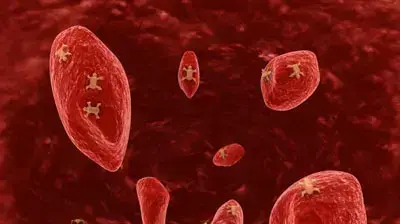Florence Cunzolo
02/07/2020 - 15:16
- Clarín.com
- Good Life
It is known that cancer is not a disease, but many. And that its diversity is not depleted in the type of tumor. Thus, three people with lung cancer, for example, will benefit from three different treatments. And one with gastric cancer can respond to a medication used in breast cancer. One of the biggest challenges facing doctors and health systems today is being able to know in advance what therapies will work for each patient and which will not. And for that you need to obtain and understand a huge flow of information inscribed in the genome of the tumors.
"The promise of precision medicine is to match patients with targeted therapies using genomics," said the ICGC / TCGA Pan-Cancer Analysis of Whole Genomes (PCAWG) Project consortium, which this week published in the journal Nature the results of the sequencing of 2,658 tumors corresponding to 38 types of cancer in 20 open access articles.
Cancer is a disease caused by mutations in key genes. What the Pan-Cancer Project achieved is to establish a comprehensive narrative, the most detailed so far , of the biological changes that determine the beginning of each tumor, which paves the way for future treatments and early diagnostic methods.
"Each of the mutations can be a possible target for the development of new medicines," said Peter Campbell, a member of the project's steering committee, in which 1,300 scientists from 37 countries joined forces.
“It is an extremely important work because it opens doors to continue advancing in the identification of new biomarkers and in the development of drugs that inhibit them, ” the oncologist Diego Kaen, who directs the clinical research area of the Rioc Oncology Center, discusses in dialogue with Clarín. Integral.
Kaen, a member of the Argentine Association of Clinical Oncology, argues that the results also certify that the future of cancer treatment will go through the deepening of personalized and precision medicine.
“You will go to a doctor's office, they will take your blood, they will do a biopsy and from that we will have the 'DNI' of your tumor , which will contain its genetic sequencing and so we will know how to treat it, regardless of whether it is in the breast, in the lung or in the brain. We will know how it is biologically and the treatment will come from there ”, predicts the doctor and researcher and predicts that, by virtue of the rapidity with which the advances occur, that could be a reality towards the end of this decade.
“In the coming years, data from genomic studies will provide information with an impact on relevant parameters, such as survival, quality of life and costs associated with the use of techniques and treatments. In addition, scientific advances will open additional therapeutic options ”, point to this newspaper from the MAGenTA work group (Map of Genomic Tumor Accionabilidad of Argentina), a project that was born from the cooperation between the Italian Hospital of Buenos Aires and its university institute , the Multidisciplinary Institute of Cell Biology (IMBICE) and the Institute of Translational Medicine and Biomedical Engineering (IMTIB), dependent on the last two of Conicet.
Reality and promises
Currently, precision medicine is used in breast and lung cancer. It is that they have been able to establish a handful of biomarkers - a protein or gene - that, if expressed in the tumor, make it susceptible to being treated with drugs that are already available. These biomarkers help select the treatment and have changed the prognosis of these types of cancer.
"We are going towards an oncology that is going to focus more on genomic sequencing than on the type of tumor, " says Kaen. If I have an X biomarker and a drug that inhibits it, it doesn't matter if it's a breast, lung or bladder cancer. ”
An example: 20% of cases of stomach cancer express HER2 / neu, one of the best known biomarkers in breast cancer, so both can benefit from the same treatment.
“In the United States, due to lower costs, a genomic sequencing is practically the same as measuring biomarkers separately. At some point it will be more convenient to sequence the genome than to measure specific points separately. That still does not happen in practice. There is a big gap between research and practice, ”says Kaen, who, in agreement with a pharmaceutical company and institutions in the United States, works on tumor sequencing of lung cancer.
Impossible not to take into account also the access gaps that widen along with the advances. "We are talking about genomic sequencing, when in Argentina there are great disparities, to the point that there are people who do not have access to a tomography. That is another discussion that must be given," says Kaen.
Sequencing the genome of a tumor has a cost of $ 4,000 to $ 5,000 . “A tumor of any kind can be sequenced. The patient can pay that money and this study of his tumor genome may be useful, or that no drug is yet available and he does not benefit from anything. ”
“As the implementation of precision medicine progresses, on the one hand with better genomic tests, and on the other because of the reduction in the costs of such tests, all this will contribute to better and more accessible cancer diagnoses, specific for each patient and better treatments tailored to each one ”, they contribute from MAGenTa.
The future of the Pan-Cancer Project
The increasingly growing matcheo among patients and targeted therapies is an aspiration of the Pan-Cancer Project. However, project leaders point out that an important barrier to this is the "daunting heterogeneity" of cancer "from tumor type to tumor type, from patient to patient, from clone to clone and from cell to cell".
What it is about is finding recurring patterns among such diversity. The construction of significant clinical predictors from genomic data is possible, they say, but it will require knowledge banks that comprise tens of thousands of patients with a complete clinical characterization, something that is impossible without international collaboration and data exchange.
The next phase of the project, advance their leaders, “will bring together the cancer genomics community together with health care providers, pharmaceutical companies, data science and clinical trial groups to create complete knowledge banks of clinical outcomes and treatment data of patients with a wide variety of cancers, along with a detailed molecular profile. ”
An Argentine map
Like the Pan-Cancer Project, the MAGenTA site is focused on the study of oncogenesis mechanisms, but does not seek to describe them, but its objective is the development of a "robust and reliable" diagnostic tool for clinical use.
The project is based on the study of ancestry, which will allow us to know whether or not there are regional differences in our population with respect to world reference genomes. The initial stage, which consisted of evaluating and validating a panel of genetic biomarkers in 52 genes associated with the development of different types of cancer, has already concluded.
“As a long-term objective, the project aims to forge a map of tumor genomic actionability in Argentina, generating for the first time frequency data with this relevance at the local level, which will be made available to the medical and scientific community of The whole country through online database. The use in clinical oncology of this tool will allow the rational application of oncological drugs , ”said Clarín the biomedical engineer Marcelo Risk, director of the IMTIB, the pathologist doctors Hernán García Rivello and Federico Jauk, the clinical doctor Víctor Herrera and the biotechnologist Walter Pavicic, who are part of the MAGenTA working group.
The multidisciplinary team concludes that for personalized and precision medicine to cease to be a promise and become an extended reality, "strategic plans are required at the national level in order to establish research projects, quality indicators, electronic medical records that integrate the data of the patients and that allow to share the information generated, within a regulatory framework that ensures the treatment of the data and the confidentiality of the information ".





/cloudfront-eu-central-1.images.arcpublishing.com/prisa/PXTLDZ4PUVFJLM6CHYFPYPWVKI.jpg)

